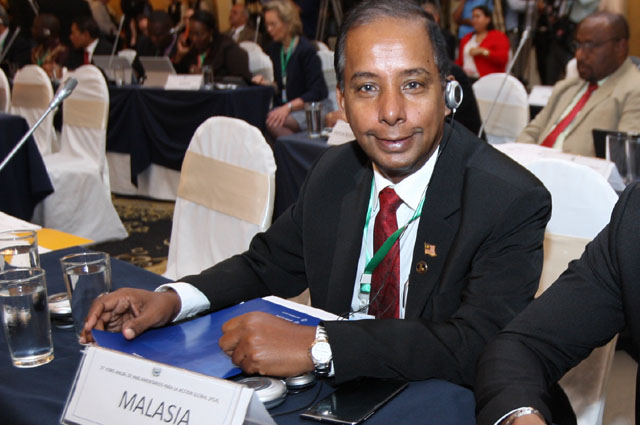
This article was originally published on Malaysiakini on August 12, 2016
Let's say no to the death penalty
MP SPEAKS First and foremost, I would like to thank Amnesty International Malaysia for inviting me to give a talk on the topic of the death penalty.
Amnesty International has been in the forefront of highlighting facts on the death penalty around the world, and why it should be abolished.
One worrying trend is the arbitrary manner the death penalty is dealt with, and lack of proportionality to the crime, due to questionable judicial processes, and prejudices inherent in the justice system of the state, besides social economic factors that deprive the poor of competent attorneys to represent them.
In Malaysia, the number of individuals currently under the death sentence is at least 1,043.
In a reply to Parliament on Nov 12, 2014, the home minister disclosed that there were 975 persons under sentence of death. Among these, 347 had filed for appeals (310 to the Federal Court, and 37 to the Court of Appeal), and 255 to the Pardons Board.
In May 2015, Prisons Department director Abdul Basir told the press that there were 1,043 death row inmates nationwide.
As of October 2013, 564 individuals had been on death row for over five years, representing just over 50 percent of all death row inmates.
In October 2012, the DPP commissioned Professor Roger Hood, Professor Emeritus of Criminology at the University of Oxford, to design and analyse the findings of a public opinion survey on the mandatory death penalty in Malaysia.
The survey of a representative sample of 1,535 Malaysian citizens from all over the country, was carried out by Ipsos Malaysia, a leading market research company.
The research was designed to elicit views on the mandatory death penalty for drug trafficking, murder and offences under the Firearms Act.
By using a series of scenarios, it showed the extent to which members of the public support the mandatory death penalty, when faced with the reality of having to judge whether the crime merits the death penalty.
In the findings, a large majority said they were in favour of the death penalty, whether mandatory or discretionary; 91 percent for murder, 74 to 80 percent for drug trafficking depending on the drug concerned, and 83 percent for firearms offences.
Concerning the mandatory death penalty, a majority of 56 percent said they were in favour of it for murder, but only between 25 and 44 percent for drug trafficking and 45 percent for firearms offences. This was basically in theory.
Large gap
When asked to say what sentences they would themselves impose on a series of ‘scenario’ cases, all of which were subject to a mandatory death sentence, a large gap was found between the level of support ‘in theory’ and the level of support when faced with the ‘reality'.
For example, of the 56 percent who said they favoured the mandatory death penalty for murder, whatever the circumstances, only 14 percent of them actually chose the death penalty for all the scenario cases they judged.
This was only eight percent of the total number of respondents. When interviewees were asked whether they would support the death penalty if it were proven that innocent persons had been executed, the proportion in favour for murder fell to 33 percent, for drug trafficking to 26 percent, and to 23 percent for firearm offences.
These findings suggest that there would be little public opposition to the abolition of the mandatory death penalty for drug trafficking, murder, and firearm offences. Public support for the death penalty for murder is also lower than is perhaps assumed, so may not be regarded as a definite barrier to complete abolition.
Research on death penalty overseas
A report released by death penalty information centre on April 18 through the prestigious National Research Council of the National Academies, based on a review of more than three decades of research, concluded that studies claiming a deterrent effect on murder rates from the death penalty are fundamentally flawed.
The report concluded: “The committee concludes that research to date on the effect of capital punishment on homicide is not informative about whether capital punishment decreases, increases, or has no effect on homicide rates."
Therefore, the committee recommended that these studies not be used to inform deliberations requiring judgements about the effect of the death penalty on homicide.
There are also various studies done in the United States, which highlight how the death penalty has been used unjustly against the black community
Jurors in Washington state are three times more likely to recommend a death sentence for a black defendant than for a white defendant in a similar case (Prof K Beckett, Univ of Washington, 2014).
In Louisiana, the odds of a death sentence were 97 percent higher for those whose victims were white, than for those whose victims were black (Pierce & Radelet, Louisiana Law Review, 2011).
Since 1973, more than 150 people have been released from death row with evidence of their innocence (Staff Report, House Judiciary Subcommittee on Civil & Constitutional Rights, 1993, with updates from DPIC). From 1973-1999, there was an average of three exonerations per year. From 2000-2011, there was an average of five exonerations per year of defendant discrimination, or both (Prof Baldus report to the ABA, 1998).
Hardly a deterrent
The death penalty in Malaysia has been hardly a deterrent in reducing serious crimes. For example, the death penalty has not resolved the drug trafficking problems due to poor enforcement related to corruption, besides the inability of law enforcement officers to cripple influential syndicates which have global links, and their ability to pay lucrative amounts to drug traffickers around the world.
In the case of homicide, the rage of individuals whose minds are momentarily clouded, leaves them in a state where they do not think about the consequences of their actions, that could lead to a death penalty.
While there are legal dilemmas facing the death penalty due to arbitrary processes, there is a need to look into a broader dimension on whether the death penalty is the right choice for the state.
There is a need to understand that death penalty could never be proportional to the crime committed due to various factors such as how the crime was committed, the manner of how factual evidence was gathered, and the socio-economic situation of the perpetrator who might not have the means to hire a competent lawyer to represent him.
Being a member of Parliament and the secretary of the Parliamentarians for Global Action (PGA), I have highlighted the injustices related to death penalty in Parliament.
It is significant that the attorney-general Mohamed Apandi Ali has stated that the government plans to review the death penalty for certain crimes. Former minister in the Prime Minister's Department Nancy Shukri has assured me in Parliament that there is a comprehensive review of the death penalty.
These are encouraging signs that show that the effort put by MPs and Amnesty international, and NGOs concerned, are beginning to bear fruit.
From the empirical research conducted, it can be concluded that the death penalty does not stand the test of due process and proportionality between crime and punishment.
The survey in Malaysia and research done overseas show there is a lack of definite conclusions on whether the death penalty in itself is able to deter crime, and there is discrimination affecting minority communities when it comes to the death penalty.
Also, the social and psychological factor of rage that blinds an individual from assessing the implications of the crime is not taken into consideration by the proponents of the death penalty.
We have to go beyond the reductionist mindset and take a broader dimension to solve violent crime in our society.
The most significant aspect of the survey is that Malaysians in general would support the abolition of the death penalty if the facts surrounding this capital punishment are disseminated through forums of this nature, with civil society, public intellectuals, and members of Parliament playing their roles.
The media should also play its rightful role in this process of education towards abolishing the death penalty.
M KULASEGARAN is for MP Ipoh Barat. The above was taken from on his speech delivered at the 'Abolition of Death Penalty' event organised by Amnesty International of Ipoh yesterday.




